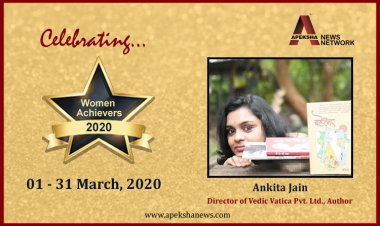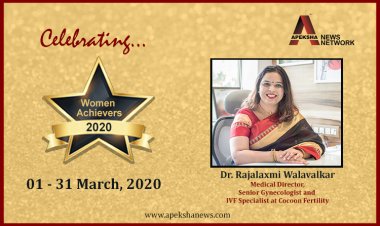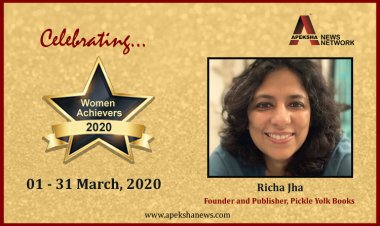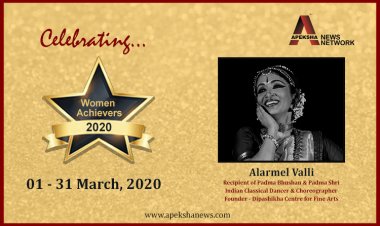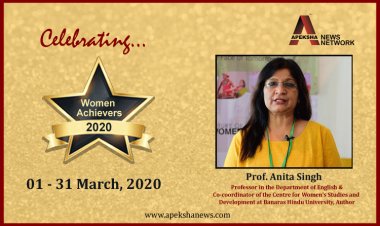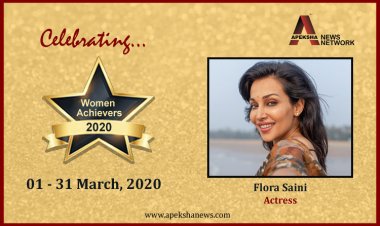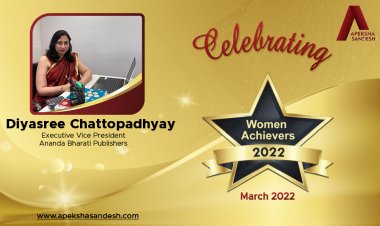“Indians today are reading the bestselling books but not the best ones.” – Author Meghna Pant
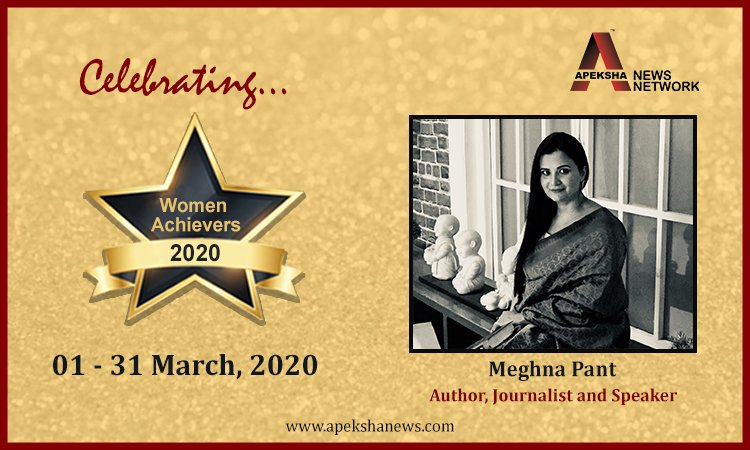
An award-winning author, accomplished columnist and a diehard feminist who never hesitates on talking about social issues, Meghna Pant is an inspiration in herself for some many in so many ways.
Her books have been published to critical and commercial acclaim, and to ensure that the aspiring authors get the right guidance on publishing as well as understand the tricks and traits of the industry, Megha came up as a support with her latest release, ‘How to Get Published in India’ – a dare which no author would go for!
She has been a speaker for India’s leading literary festivals, panel discussions and conferences.
Meghna's debut collection of short stories ‘Happy Birthday’ (Random House, 2013) was long-listed for the Frank O'Connor International Award 2014, while her debut novel ‘One and a Half Wife’ (Westland, 2012) won the national Muse India Young Writer Award and was shortlisted for several other awards, including the Amazon Breakthrough Novel Award. She is the recipient of the FON South Asia Short Story Award (2016) and the Bharat Nirman Award (2017).
Apeksha News Network had a conversation with ace author Meghna Pant about the Indian publishing industry and the kind of literature India needs. Check out the excerpts.
You had a successful career in journalism, but you quit it and became a full-time writer. Please tell us more about this shift in career.
I harboured no dreams of being a writer when I was young, though I did dabble in writing. I was 19 when my first short story, Aberration, was published online. The plot and characters stayed with me for months before I gathered the wherewithal to finish the story. But the discipline of writing, its stark loneliness, does not usually appeal to the young and skittish. So, I did what all Indian children are taught to do - I acquired degrees - an undergraduate degree in Economics and a double master’s degree, including an MBA. Post my studies, I worked in corporate finance and then switched to business journalism.
I started writing seriously in my late 20s, though at that time it was only short stories. To improve my art, I took several writing courses in New York, and after a fair share of rejections, my short stories began to be published in reputed US literary magazines. The idea for a full-length novel, One & A Half Wife, came only in 2010, and that’s around the time I also started putting together short stories that would come together in the collection ‘Happy Birthday!’. The moment I saw 'One & A Half Wife' on the bestseller list in a bookstore in 2012 was the first time I let myself admit that I was a writer. And I have not wanted to be anything else since.
What is the biggest struggle of an author/writer/novelist today in India?
The biggest obstacle a new writer will face after finding a suitable publisher is finding a loyal base of readers. Why? Because there are 82,000 new books that get published in India every year, of which around 22,000 are in English, and only 2% of these books make it to bookstores. And you are not just competing with these books. There are around 2.2 million books that get published globally every year. 75 million books already exist on this planet. You are also competing for people’s time. You are competing to get that reader off his phone, off Twitter, off WhatsApp, to pick up your book and take out the time to read your book. You are competing with movies, plays, comedy shows, iPad’s, video games, Netflix, Amazon Prime, Peppa Pig, Taylor Swift, the 10,000 movies that come out every year, and the 75,000 music albums that come out every year. So, when you have invested a few years or months of your life to write your book, develop the patience and persistence to spend a month or two to market your work, so your book finds the right readership base.
Literature plays a huge role in the growth of the country, considering culture, youth, etc. According to you what kind of literature India needs currently?
Most bestsellers today have a cut and paste formula––write in simple language, put a finger on the pulse of modern urban Indian life, devise fast-paced narratives with plenty of emotions and drama, identify a specific market, target the customer, keep the price point of the book between rupees ninety-nine to one hundred and fifty, market well, and, most importantly, track the product.
It is rather worrisome that literature in India has become this formulaic. Authors are cashing in on trends like IIM-IIT campus novels or mythology or self-help books, and no one is pushing the envelope. If nothing new is being said or written, books in India will not have any transformative or evocative power. This will lead to Indian writing becoming too secure, too staid. It will take focus away from writing good books to selling bad books. In this way, the bestselling phenomenon corrupts writing. It focuses on gaming the system, instead of adding something of value to the system. It makes the bestselling authors focus on numbers instead of stories. This trend merits examination and begs for change.
Our country deserves better literature. Indians today are reading the bestselling books but not the best ones. Bestsellers can be ‘manufactured’ by pumping in money and low-price points, but thankfully awards cannot. So, when you buy a book check the author’s writing credentials, see how many awards they have won, if they have been published abroad. If you make only ‘bestsellers’ as your criteria for buying a book, you will most likely leave disappointed, and if you are willing to spend only Rs. 150 or less on a book, then be prepared to read inferior literature. If you are a writer, as you begin your writing journey, make sure that this greed for money and fame, for making the ‘bestseller list’, does not stop you from creating good stories and writing good books.
eBooks have been in trend. Is it a pro or a con for the literature industry?
Let us take a look at some numbers. 90% of all books published in India sell less than 2000 copies every year. A paltry 9% sell between 2000 to 10,000 copies, and––hold your breath –– less than 1% sell more than 10,000 copies. While this number sounds ridiculous, considering we are a population of almost a billion and a half, a book is typically considered a bestseller when it crosses this coveted 10,000 mark within a year of its publication. Despite our technological advances, digital revenue is still only 3-4% of total sales. The answer is in the facts.
These days, every other person wants to be an author. Do you think that the increasing chaos in the literature field is affecting the readers? In such circumstances, what should authors do to ensure they reach their right target audience?
Be professional. Read my book ‘HOW TO GET PUBLISHED IN INDIA’ published by Bloomsbury. Not because I have written it but because it is India’s first and only comprehensive book on how to write, publish and sell a book. As a new writer, the process of making your dream into a reality feels incredibly daunting given the lack of information out there. This book is filled with the advice I wish someone had given me when I was starting out.
The book also includes never-before-collected essays from experts, including Jeffrey Archer, Shobhaa De, Twinkle Khanna, Ashwin Sanghi, Meena Kandasamy, Durjoy Datta, Preeti Shenoy, Rashmi Bansal, Ravi Subramanian, Anand Neelkantan and many more. It busts myths and answers questions as varied as which publisher would be best for your work, how to overcome writer's block, how to manage your finances, how to write a cover letter and how to become a bestselling author.
How do you think your sector will change in the next 5 years?
The biggest change will be thanks to OTT platforms seeking good content. TV showrunners from streaming channels and traditional channels keep a lookout for interesting books. If they think the book is commercially viable as a TV show, they contact the author or publisher. If they think the book is not commercially viable but the writer can add value to their show, then they ask the author to become a part of the writing team without buying the book rights. Fortunately, new-age content creators are looking for good content, which means that publishers can see a direct pay-off by publishing good content. It is a win-win for everyone - the author, the publisher, the reader, the platform and the audience.
In your opinion, does the glass ceiling exist for women, in your sector?
Sexism exists in every corner of India, including publishing. Less than one-tenth of the prestigious Sahitya Akademi Awards have gone to women, although the awards given to women writers has increased over the last three decades. The popular Crossword Book Award has been awarded to twice as many men as women. Only one woman has won The Hindu Prize, only two women have won the DSC Prize for South Asian Literature. If you try to point to evidence that publishing is not biased towards men, you will come up short. Almost all award-winning books feature male protagonists and/or are authored by men. Even ‘best writers’ lists feature almost all men, along with the same two-three token women. In fact, whenever I am mentioned among the best Indian writers, there is always ‘female’ put before this ‘honour’, because apparently my most visible identity is also my most defining identity. The gender in power gets the noun while the other gender gets the adjective. It’s pitiful, and I hope things change soon.
What will be the biggest challenge for the generation of women behind you?
To pay it forward to the next generation of women until we become truly equal.
What does International Women’s Day mean to you? Is it important that we have one?
Since men have their hu’man’ity and ‘man’kind, I think a day to pause and reflect on where women in our society stand today is important.
Please share a few tips and tricks for aspiring authors?
Writing a book is like jumping off a cliff without knowing where you will land, or whether you will land at all. So, flap your wings and learn to fly.
Please share some details about your upcoming book, and when will it hit the stands?
I have a newborn and a toddler who are consuming me at the moment but writing always finds a way to me. So, I am editing my upcoming novel that is inspired by my life story and adding the finishing touches to a collection of short stories.
Apeksha News Network congratulates Meghna Pant for her contribution and commitment towards the society with her works as well as words and wishes her all the best for her future endeavours!



